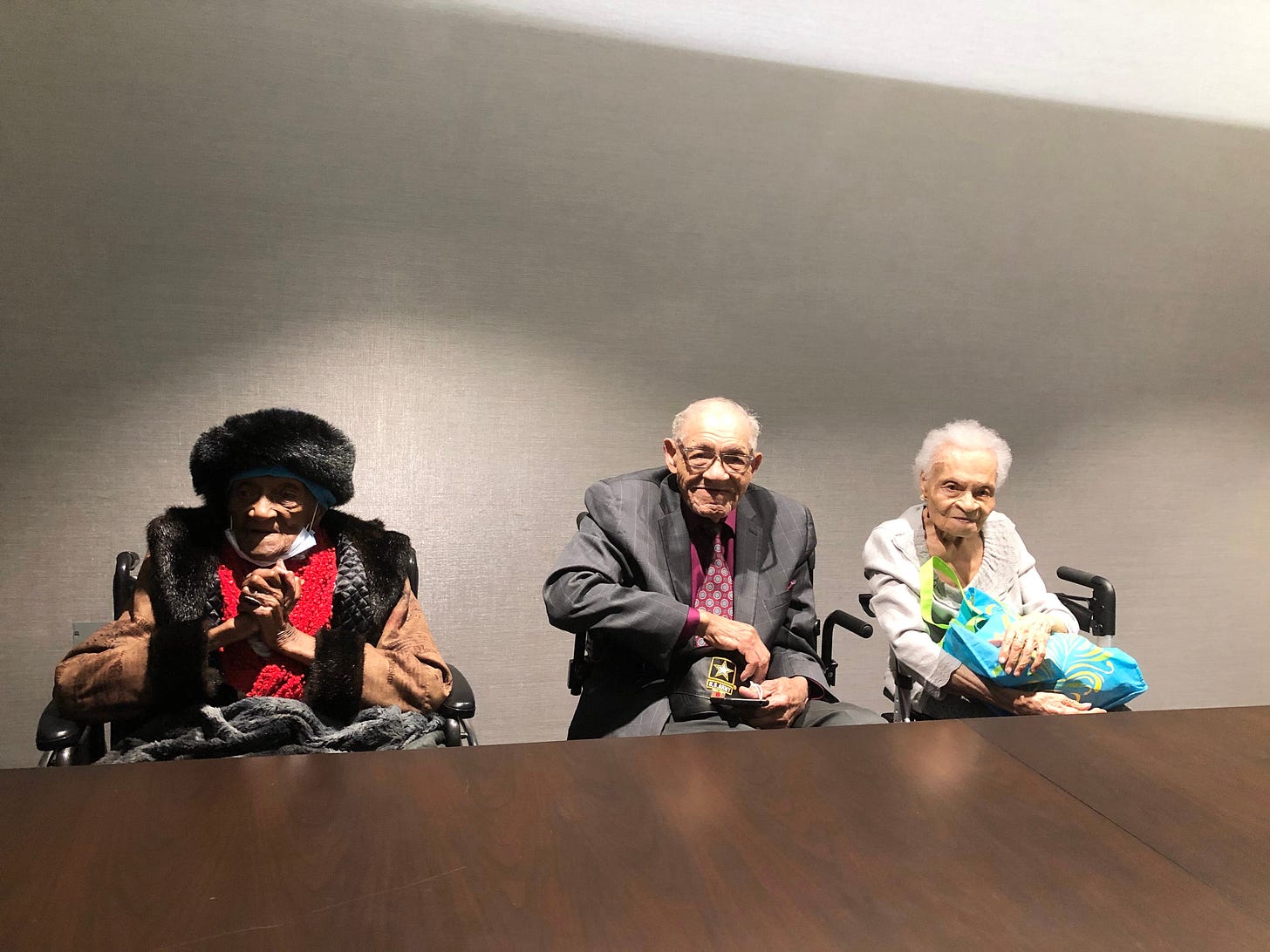On Surviving
Race massacre survivor Hughes Van Ellis has passed away
When Hughes Van Ellis was 22 years old, he was drafted into the Army to fight in the Pacific Theater during World War II. Leaving behind his wife and two-month-old son in Oklahoma, he traveled to the island of Saipan, where he served in an anti-aircraft artillery unit in an all-black battalion. “I was proud to serve my country,” he said in a 2012 interview.
It wasn’t his first brush with organized violence. Mr. Ellis was born in January 1921 in Holdenville, Oklahoma; just a few months later, his family moved to the bustling neighborhood of Greenwood, which was attracting thousands of black families across the nation who were seeking a better life. “They had their own cabs, they had their own theaters,” Ellis recalled. “They had their own businesses. I guess the white people thought they were getting along pretty good so they tried to burn the black people’s houses down.”
On Monday, Ellis passed away in Colorado at 102 years old. He was one of three known living survivors of the Tulsa Race Massacre.
I had a few opportunities to meet with Mr. Ellis in recent years. He was a warm soul who loved life. A proud veteran, he was always wearing a U.S. Army hat. I remember how practically giddy he was to meet Vanessa Williams when she came to Tulsa a few months ago. It makes me smile to know that he and his older sister, Viola Ford Fletcher, got the chance to visit Ghana two years ago, after Ms. Fletcher talked about her dream of going to Africa.
But Mr. Ellis was also brought to tears on the floor of Congress in 2021 when he asked our governmental leaders why he, his sister, survivor Lessie Benningfield Randle and the thousands of race massacre descendants have been denied any semblance of justice for 102 years. “I fought for freedom abroad, even though it was ripped away from me at home, even after my home and my community were destroyed,” he said in his testimony. “I did it because I believed, in the end, America would get it right.”
Mr. Ellis, Ms. Fletcher, and Ms. Randle, who filed a high-profile lawsuit seeking restitution for the massacre in 2020, have become internationally known in recent years. They are ambassadors for a struggle for justice that stretches back to June 2, 1921, when Greenwood still smoldered. But it is deeply sad that three centenarians (Ms. Fletcher and Ms. Randle are 109 and 108) have spent the last few years in courtrooms and legislative chambers being met with indifference or neglect by our nation’s most powerful institutions.
Pictured left to right: Lessie Benningfield Randle, Hughes Van Ellis, Viola Fletcher
The survivors went before Congress. The survivors have made multiple appearances at the Tulsa County courthouse, where their reparations lawsuit was recently dismissed by a local judge (the case is being appealed to the Oklahoma Supreme Court). Just last week, Ms. Fletcher and Ms. Randle were at the Oklahoma State Capitol to participate in a study hosted by Rep. Regina Goodwin on the multiple possible pathways toward justice that the state legislature could spearhead.
I've watched the various halls of power kick responsibility for restitution around like a soccer ball. It often feels like they are waiting out the clock, and what I've learned in my last few years as a budding historian is that systems of oppression are incredibly patient.
So it's up to us to make the issues here in Tulsa urgent. Keep the memory of Mr. Ellis alive, and the specific repair that he fought for, even after national attention moves on from Tulsa. Human stories have a way of transforming people’s minds and hearts, even after the carries of those stories have left this world. That is one way we deny this city and country's insistence that what happened to black people here and across America is yesterday's news.
Rest in Peace to Mr. Hughes Van Ellis.


Thanks for this. Amazing that these survivors are still seeking justice. Can those of us who are not residents of Oklahoma help? Is there a petition we can sign? Email we can send to the Ok legislature, Governor, etc?
Write on Victor!